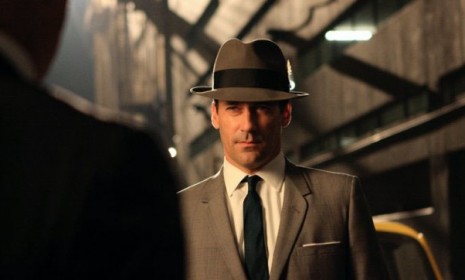Time for the Supreme Court to allow swearing on TV?
Curse words and nudity are all over cable TV. Now the Supreme Court is debating whether networks should be able to follow suit

A free daily email with the biggest news stories of the day – and the best features from TheWeek.com
You are now subscribed
Your newsletter sign-up was successful
In a case that could spell big changes for TV viewers, the Supreme Court is considering whether the government should stop preventing television networks from airing curse words and nudity now that most Americans have unlimited access to adult material on cable TV and the internet. The broadcasters want the justices to throw out a 1978 decision upholding the Federal Communications Commission's authority to police the airwaves, saying the policy to set decency standards is outdated and confusing. Is it time to loosen up the rules?
The end of the censorship is long overdue: In 2012, Americans are watching shows like Californication and Mad Men, says the Los Angeles Times in an editorial, but the supporters of FCC censorship — including some conservative justices, judging by their questions in this case — are stuck in 1963, ready for an episode of Bonanza or Gunsmoke. "Everyone has cable these days, and if you want shows featuring sex and drugs and bad language," all you have to do is click the remote. Singling out broadcast TV is unfair.
"Bonanza is alive and well at the Supreme Court"
The Week
Escape your echo chamber. Get the facts behind the news, plus analysis from multiple perspectives.

Sign up for The Week's Free Newsletters
From our morning news briefing to a weekly Good News Newsletter, get the best of The Week delivered directly to your inbox.
From our morning news briefing to a weekly Good News Newsletter, get the best of The Week delivered directly to your inbox.
The argument the networks' owners make is flawed: The broadcast networks are currently a haven for parents who want to protect their kids from the obscenities of cable, says Parents Television Council President Tim Winter at USA Today, and "our children deserve [that] modicum of protection." Besides, Disney, NewsCorp., Comcast, and Viacom, the companies who own the networks — and who claim they can't compete with cable in the current environment — "also own nearly all of the cable channels they are supposedly forced to compete against."
"Kids need protection from broadcast indecency"
At the very least the court should make the rules clearer: "It's long been said that indecency is in the groin of the beholder," says Alexandra Petri at The Washington Post. That explains why sometimes networks get fined for shows that air the f-word — or reveal a bare buttocks, as a 2003 NYPD Blue episode cited in this court case did — while the FCC doesn't bat an eye over the broadcasting of a film full of salty talk, like Saving Private Ryan. If dirty words are never OK, the justices should say so. If they're OK, but only in a Spielberg film, they should say that, too.
"Supreme Court justices, bare buttocks, and the FCC"
A free daily email with the biggest news stories of the day – and the best features from TheWeek.com
-
 The ‘ravenous’ demand for Cornish minerals
The ‘ravenous’ demand for Cornish mineralsUnder the Radar Growing need for critical minerals to power tech has intensified ‘appetite’ for lithium, which could be a ‘huge boon’ for local economy
-
 Why are election experts taking Trump’s midterm threats seriously?
Why are election experts taking Trump’s midterm threats seriously?IN THE SPOTLIGHT As the president muses about polling place deployments and a centralized electoral system aimed at one-party control, lawmakers are taking this administration at its word
-
 ‘Restaurateurs have become millionaires’
‘Restaurateurs have become millionaires’Instant Opinion Opinion, comment and editorials of the day
-
 The billionaires’ wealth tax: a catastrophe for California?
The billionaires’ wealth tax: a catastrophe for California?Talking Point Peter Thiel and Larry Page preparing to change state residency
-
 Bari Weiss’ ‘60 Minutes’ scandal is about more than one report
Bari Weiss’ ‘60 Minutes’ scandal is about more than one reportIN THE SPOTLIGHT By blocking an approved segment on a controversial prison holding US deportees in El Salvador, the editor-in-chief of CBS News has become the main story
-
 Has Zohran Mamdani shown the Democrats how to win again?
Has Zohran Mamdani shown the Democrats how to win again?Today’s Big Question New York City mayoral election touted as victory for left-wing populists but moderate centrist wins elsewhere present more complex path for Democratic Party
-
 Millions turn out for anti-Trump ‘No Kings’ rallies
Millions turn out for anti-Trump ‘No Kings’ ralliesSpeed Read An estimated 7 million people participated, 2 million more than at the first ‘No Kings’ protest in June
-
 Ghislaine Maxwell: angling for a Trump pardon
Ghislaine Maxwell: angling for a Trump pardonTalking Point Convicted sex trafficker's testimony could shed new light on president's links to Jeffrey Epstein
-
 The last words and final moments of 40 presidents
The last words and final moments of 40 presidentsThe Explainer Some are eloquent quotes worthy of the holders of the highest office in the nation, and others... aren't
-
 The JFK files: the truth at last?
The JFK files: the truth at last?In The Spotlight More than 64,000 previously classified documents relating the 1963 assassination of John F. Kennedy have been released by the Trump administration
-
 'Seriously, not literally': how should the world take Donald Trump?
'Seriously, not literally': how should the world take Donald Trump?Today's big question White House rhetoric and reality look likely to become increasingly blurred